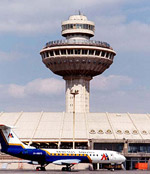Starting from today, the airports of Armenia will not allow passengers to take baggage on the plane that doesn’t belong to them.
Very often, one can witness cases when people ask passengers to check in their baggage or carry it on the plane. They ask the passengers to take those items to their friends or relatives, who will be waiting for them at the airport. Almost no passenger refuses to do so. I think we have all faced things like that. But starting from today the airport forbids passengers to do favors like that. According to the words of the head of the Civil Aviation Department, Artem Movsisyan, the order comes from the security of aviation, because in cases like that the passenger doesn’t even check what’s inside the parcel or envelope. Perhaps the transportation of the substance inside the parcel is forbidden. Thus, starting from yesterday, the new law on aviation of RA has been activated. This law, compared to the previous one, has been changed by 80%. According to Movsisyan, one of the main changes of the law is the improvement of security. This improvement provides better protection for passengers. Besides plane insurance, two more types of insurance must be applied for now – for the passenger and the third person. According to Movsisyan, mandatory insurance must be collected by air companies, and it won’t affect the price of the tickets. Everybody has great doubts abut that because our businessmen hate to harm their pocketbooks. Regarding the protection of the passengers’ rights, strict norms are going to be applied here. If the flight is delayed for two hours then the company should provide the passengers with food. If the flight is delayed for 4 or more hours, besides food the air company will provide the opportunity to speak on the phone. If the flight is delayed for 8 hours then the company must provide accommodation for the passengers. Of course those improvements in the law are useful because the rights of the passengers are not ignored. However we don’t know how we are going to punish the only air company of our country – Armavia–if it delays its flights. Everybody knows that the company is strongly supported by the government and has never been punished by anybody for anything. Movsisyan told news reporters that he disagrees with the opinion of Saumia Mitra, a World Bank expert, reflected in the sustainable economic policy report. In it, Mitra said Armenia should lower the prices of transportation of passengers and cargo by air. The WB expert explained the current situation by the monopoly of Armavia, the national airlines, and the policy of the Civil Aviation Department, which hinders the liberal development of the market. “We disagree with most statements in the World Bank report. We have met with the World Bank experts a number of times and presented financial and economic grounds,” Movsisyan said, adding that the market is open to other companies. Movsisyan says we need national airlines both in terms of economic expediency and national security. Besides, Movsisyan informed that from April 7 non-regular cargo flights to Armenia will not be levied 10 million drams, which is a step to make the aviation market attractive for foreign companies.
Armenia’s civil aviation authority rejected a recent World Bank study which concluded that its protectionist policies not only restrict air travel but also impede overall economic development. The study, officially presented late last month, listed civil aviation among the lucrative sectors of the Armenian economy that have been effectively monopolized by businessmen close to the government. It said the government is keeping prices of air transport artificially high in order to benefit the Armavia national airline. Movsisyan admitted that Armavia is enjoying privileged treatment by the state, but insisted that that is good for the country. “Why should our aviation market be controlled by a foreign carrier?” he said. “It’s better to give control of the market to our carriers because they pay taxes here, while foreign companies don’t. This is also a matter of national security. We need to have a national airline,” he said, adding that foreign carriers rarely flew to Armenia during its war with Azerbaijan and may well do the same in the event of renewed fighting. “We have rejected many points made by the World Bank,” Movsisyan said at a news conference. “We have had numerous meetings with World Bank officials and presented our financial and economic justifications.” Armavia enjoys the state-guaranteed rights to fly to popular destinations in the former Soviet Union and Europe, having inherited these rights from Armenian Airlines, the now bankrupt state-run carrier. The company, owned by a Russian-Armenian businessman with close government ties, has faced greater competition in recent years, with several Western airlines currently carrying out regular flights to Yerevan. However, that has not led to a sizable reduction in air fares, which World Bank experts say remain well above the European per-mile average. Their study blamed the high fares on the fact that the volume of freight shipped by air to and from the landlocked country, blockaded by two of its neighbors, fell by more than two thirds between 1997 and 2003. It said making air travel and transport more affordable will be increasingly essential for maintaining Armenia’s high rates of economic growth.

